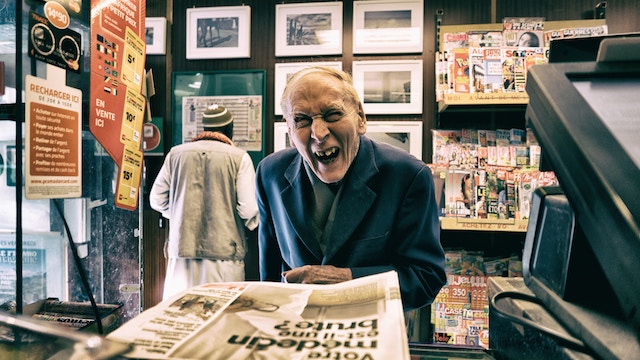Unlock the Magic in Your Story Now
Get the Free 20 questions to Ask Before Launching Your Idea workbook when you sign up for occasional updates.
Get the Free 20 questions to Ask Before Launching Your Idea workbook when you sign up for occasional updates.
Articles filed in: Success
People Want Places, Not Platforms
filed in Innovation, Meaningful Work, Success

Do you see all those people who whipping their smartphones out as soon as they get on the train or stand in a queue? They’re not just avoiding boredom, they’re searching—but not only for information, or laughs, or updates. They are searching for a feeling of connection.
We want places to go and places to be. Places to kill time and places that make us feel a little less lonely in the moment. Places to learn. Places to share. Places that make us feel safe, or smart, or welcomed, or funny, or hopeful for the future. But most of all, we want places to belong and places where we feel like we matter.
Those places used to be our family homes, our dinner tables at 6 pm, or football games with friends on Saturday afternoons. Increasingly they are digital spaces.
Whatever you’re building, think beyond features, functionality and design and think first about how the person you serve wants to feel when she arrives at the place you’ve built.
Image by Hugh Han
Growing Small
filed in Meaningful Work, Success, Worldview

I remember landing my first ‘real’ job like it was yesterday.
One of the big British supermarket chains was opening a huge store not far from where I lived in Dublin. It was good news for the hundreds of people who would be employed there—more jobs, more choice for consumers—a win-win.
At fifteen, I thought I would get a weekend job on the checkouts, but instead, I was given the title, Stock Control Assistant, a navy blue uniform, and a clipboard. My job was to ‘assist’ the stock controller—a man wearing a red blazer, with a bigger clipboard, to record how much produce had been sold in the past week. The Stock Control Assistants met at eight o’clock every Saturday in the draughty warehouse before being assigned a section to record. The unlucky ones were assigned to frozen foods—not much fun in Dublin winters.
By nine, I’d find myself scaling shelves in the warehouse, crawling over pallets of baked beans and instant soups, counting every single packet and can. After lunch, we’d move into the store to count the items on the shelves. We were under strict instructions to stay on task and not to ‘serve’ customers while we were on the shop floor. That was somebody else’s job.
I’d kneel on the floor in front of the macaroni cheese so I could see right to the back of the shelf, making sure I was recording the right number. Then a shopper would reach over me, take a can, and pop it in his basket.
Two weeks in I realised our job was futile. However accurate we tried to be, we’d never get the numbers right. But the part of the job that mystified me more was the instructions about leaving customers to their own devices. How could we ignore the elderly lady who was struggling to reach a jar of beetroot on the top shelf? Surely well-stocked shelves and low prices weren’t enough to keep customers coming back?
What I’d witnessed about how to build a business growing up in the suburbs was the opposite of this. My mother’s butcher knew her by name and her order by heart. The grocer stopped and chatted to her for what seemed like an eternity to us kids waiting to pay and get home to play. The baker would make sure he only sold her the freshest bread. None of these small business owners won by having the most stock. They won by taking the most care.
As you’ve probably guessed, I didn’t last long in the giant supermarket. The salary and subsidised lunches weren’t enough to keep me there. They didn’t feed my soul.
The big store lives on today. But it’s not as popular as it was in those early days when it first opened. And the supermarket chain is changing its strategy. Like many retailers, they are opening smaller, local stores to cut costs. Going small is the new growth strategy. It looks like we are circling back to a time of more care and connection. I believe that’s what our customers (and we) want.
Image by Johann Walter Bantz
Looking For Someone
filed in Marketing, Strategy, Success

One day, maybe today—you will get an email enquiry or a call from a person who says they are ‘looking for someone’ who does what you do, to help them to achieve their goals.
You will be tasked with convincing this person you are the right ‘someone’ for the job.
You will need to find the right words and price to make them pick you above the other options they are considering.
Imagine how much better your story and your work would be if you weren’t aiming to convince everyone.
How can you become the one for the people you want to matter to?
Image by Brandon Lopez
Like The Weather
filed in Success

The weather is a favourite preoccupation of many people in the city where I was born.
‘Lovely day!’ Someone might say.
‘Looks like it might rain later, though.’ Comes the reply.
We’re all guilty of obsessing over the one thing we can’t control.
We can always blame the weather if the gathering we’d planned doesn’t go as we’d hoped.
But often the thing we can’t control distracts us, getting in the way of the things we can affect or change.
We can choose to be wet and miserable or we can wear wellies and pack an umbrella.
Image by Neon Brand
Storytelling Is A Skill You Can Learn
filed in Marketing, Story Skills, Success

Do you remember the first time you rode a bike without training wheels? You might recall who taught you and the street you were on. The colour of the bike. The exact moment you took off. The wobbling, the delight, and cheering as you pedalled away.
One minute you couldn’t do it and the next minute you were off. You had acquired a new skill and the confidence to keep practising—so you got better and better at it.
Learning to tell your story is a lot like learning to ride a bike. There are basic principles and tools you can use to get started, and the more you practice the better you get. Story skills are essential for people like you who want to make their ideas matter.
That’s why I’ve been working with Seth Godin for almost a year to create a workshop that will help you to discover, craft and tell better stories.
The Story Skills Workshop launches next week.
Sign up here to be notified when registrations open.
Image by Eli Christman
Worthy
filed in Story Skills, Strategy, Success

If you’re reading this post, it’s because it got past one or more of your filters. Maybe you were anticipating receiving it because you subscribed to my blog. Perhaps it popped up in your search results. Either way, you’re here because you chose to be—not just because I reached out to you.
The people you’re trying to reach and resonate with are filtering too. From the contacts you try to add on LinkedIn, to the clients you’re hoping to attract. They are deciding who is worthy of their permission and their time.
So the question for you and me is not just how do we get past the filters, but how do we become worthy of the limited time and attention of the people we want to matter to?
Image by JM Thomson
Stand Out

When we think about standing out, we often think about how we’re being perceived at a given moment. But memorable people, places and experiences stand out because of how they make us feel over time.
Standing out doesn’t necessarily mean being the loudest, most visible person in the room right this minute.
You, your product or your company can stand out by changing how someone feels about themselves in your presence, not just today, but every day.
Image by Chris Candid
Immeasurable Success
filed in Success

The rows of business magazines in the airport scream the word ‘success’ from their covers.
Smiling founders who’ve ‘made it’ are profiled inside.
Their success reflected in the visible and the measurable.
When did being successful become about being seen to have achieved success?
We, the keepers of our culture, keep score.
We like to measure our progress. Come out on top. Be first. We like to win.
In our attempt to find a way to do that, we have learned to value and measure things in ways that are often disproportionate to their benefit to us collectively. How we keep score changes the stories we tell, the businesses we build and the societies we shape.
The stories we tell about success change us.
We become what we measure.
We are who we take with us on the journey and who we leave behind.
Image by Austin Distel
The Power Of Owning Your Work

The assistant at the family-run pasta shop is giving me instructions about how to cook the fresh ravioli she’s wrapping up for me to take home.
She never once refers to it as ‘the ravioli’ during the entire conversation. Whenever she speaks about the pasta her family makes fresh on the premisies every day, she describes it with pride as, ‘my ravioli’.
‘You can’t fail with my ravioli. My ravioli doesn’t need an elaborate sauce to make it taste great. That’s why people always come back for my ravioli.’
She was signing her work with every word. The way she speaks about her product makes it better and more valuable to the people lucky enough to eat it.
How are you owning the work you’re proud of?
Image by Jametlene Reskp
Disappointment And Delight

One day you will disappoint a customer.
You will let her down by failing to do the thing you promised.
She will leave that day feeling like she got less than she paid for.
But more than that, she will stop trusting that you will keep your word next time around.
Things don’t always go to plan. Mistakes happen.
That’s why it’s important to allow for them.
You are human. You won’t always get it right.
But you can find an opportunity to delight, especially when you disappoint.
A mistake doesn’t always have to end in disappointment.
Image by Brian J. Beggerly